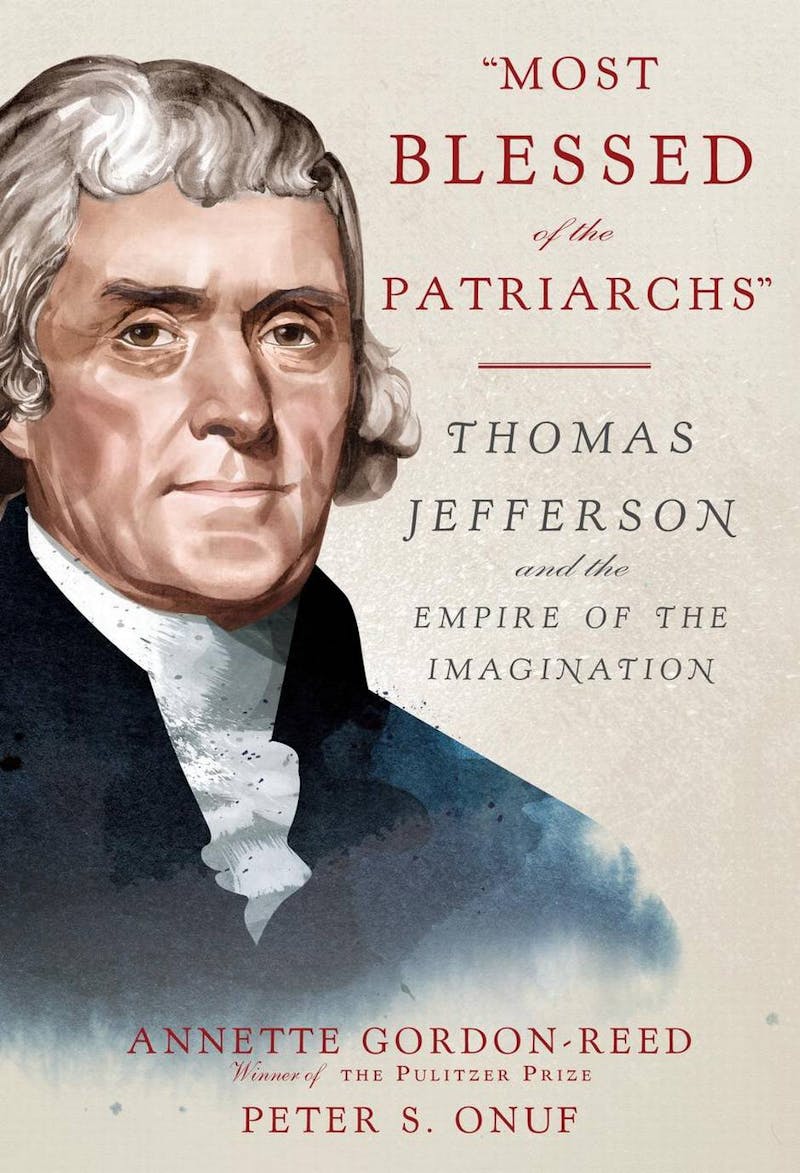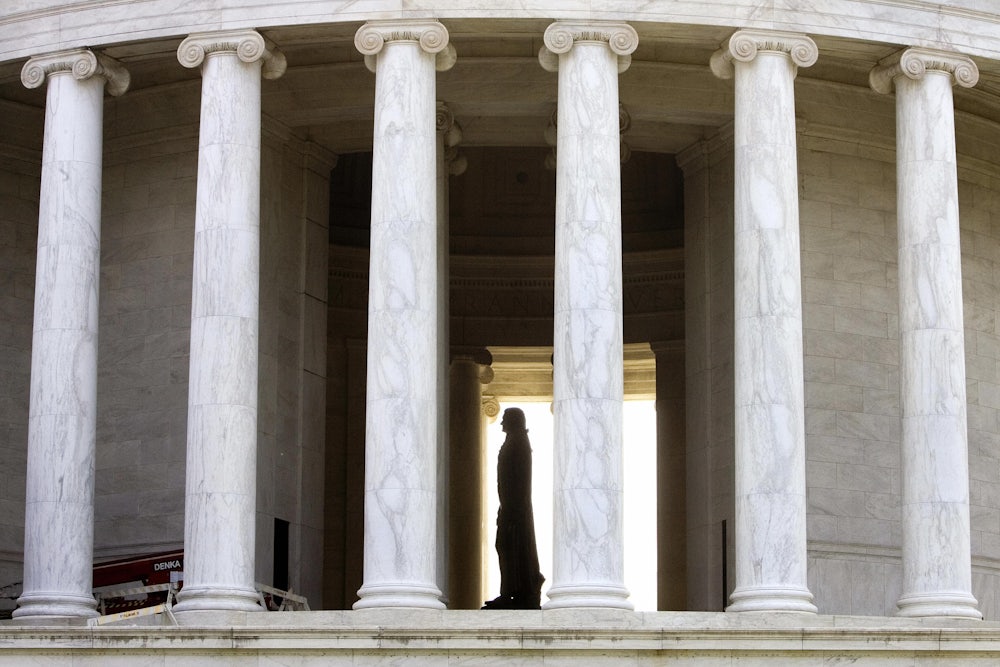At a 1962 White House dinner honoring Nobel Prize winners, President Kennedy remarked, “This is the most extraordinary collection of talent, of human knowledge, that has ever been gathered together at the White House, with the possible exception of when Thomas Jefferson dined alone.” The witticism is apt, yet we might wonder if Jefferson ever dined alone. So large and varied were his accomplishments and failings, and so profound his contradictions, he might appear to us as a whole community of geniuses and devils rather than a single man. The title of a major 1996 biography, American Sphinx: The Character of Thomas Jefferson, by Joseph Ellis, reflects the challenge. Although Jefferson’s capacious inner and outer life is as well documented as anyone’s from the revolutionary era, he remains a mystery.

In their new book ‘Most Blessed of the Patriarchs’: Thomas Jefferson and the Empire of the Imagination, Annette Gordon-Reed and Peter S. Onuf, two of the most eminent living Jefferson scholars, take their turn trying to answer the riddle. Their method is to investigate Jefferson from the inside out. Rather than reviewing the well-known facts of his political and personal life, they explore Jefferson’s sense of himself and his place in the world. And they are willing to accept that this self-conception may be a tangled, complicated one, quoting the Portuguese poet Fernando Pessoa’s maxim that “each of us is several, is many, is a profusion of selves.”
The key to Jefferson’s paradoxes, they argue, is that
he gradually came to see himself as a “republican patriarch.” He reconciled his
commitment to equality with his sense of personal superiority and desire for
control by dividing life into two spheres, public and private. In the public sphere,
he thought of himself as a citizen among equal citizens, while in the home he
considered himself a benevolent patriarch—a home which, in the case of
Monticello, included not only children, grandchildren, in-laws, and servants,
but also several dozen slaves. (It would have included a wife as well, but Martha
Wayles Jefferson died young, and he never remarried.) The title of the book
comes from a 1793 letter in which Jefferson says that if his second daughter
marries as happily as his first, “I shall imagine myself as blessed as the most
blessed of the patriarchs.” Unlike the Biblical patriarchs, however, Jefferson
sought not only to be a benevolent master of his family and their slaves, but also
to be a citizen, that is, an equal member of a democratic republic.
Most Blessed of the Patriarchs is not a biography in the usual sense. It is arranged thematically rather than chronologically. Each chapter examines one force—“Virginia,” “Politics,” and “Music,” for example—that shaped Jefferson’s philosophy of life, and traces how it influenced his self-understanding and his journey from youth to old age. Jefferson’s conception of himself as a “republican patriarch” is seen as the center of his unbelievably diverse interests and endeavors. Much of the fascination of the book is that, in a relatively short span, it examines Jefferson not only as statesman and plantation owner, but also as philosopher, scientist, author, musician, inventor, architect, educator, father, and friend.
Although Gordon-Reed and Onuf look at Jefferson’s life as a whole, the center of gravity in their study is the topic that has perplexed observers since the eighteenth century: Jefferson and slavery. What does it mean that the man who drafted the Declaration of Independence, and who came very near to capture and probable execution as wartime governor of Virginia fighting for popular sovereignty, was also a slave owner? He was one of the most radical American revolutionaries, yet as Gordon-Reed and Onuf put it, “What has fascinated (and annoyed) many observers of the man, from his time until well into our own, is that he would dare to launch himself into this role from such an improbable base of operations: a slave plantation.”
They seek an answer by examining Jefferson’s evolving understanding of the institution of slavery, his place in it, and its place in the American republic. They don’t question the sincerity of his oft-repeated conviction that slavery is a “moral and political depravity,” and a “cruel war against human nature itself.” Rather, they interpret his relationships with Monticello and its slaves in the context of a more-or-less coherent worldview that abhorred slavery but was at a loss about how to end it in America. Jefferson hoped for a future in which not only the United States but the world would know only free and equal citizens but, as he could not find the path from here to there, he sought, as a “republican patriarch,” to ameliorate the condition of those in his charge until history turned a page.
Jefferson saw from early on that slavery was incompatible with the principles of the American Revolution. There was the obvious point that slavery violates the ideal of political equality. But Jefferson dug into the psychological effects of slavery on both slave and owner. A chapter of his only book, Notes on the State of Virginia, addresses the “unhappy influence on the manners of our people produced by the existence of slavery among us.” He writes:
With what execration should the statesman be loaded, who permitting one half of the citizens thus to trample on the rights of the other, transforms those into despots, and these into enemies, destroys the morals of the one part, and the amor patriae of the other.
Influenced by the French philosopher Montesquieu, Jefferson argued that slavery is incompatible with popular government because it destroys the social and psychological foundation of democratic institutions. Despots on the plantation could not be good citizens in the town meeting; and slaves would, understandably, not be patriots in a state that had legitimated their oppression.
But what to do about it? Early in his career Jefferson offered a plan for straight emancipation, but his proposal was not given a hearing by the Virginia legislature; it was, Gordon-Reed and Onuf write, “quashed by opposition forces before it could even be raised.” Forcible abolition was also impossible, because even if the political will had existed, there was no federal army, and no infrastructure, for a military occupation of the plantations. In any case, such a course would have destroyed the union in its infancy. Ultimately, Jefferson wasn’t sure that former slaves and masters could ever be reconciled, yet he saw that expatriation wouldn’t work either, because “one million of these fighting men,” meaning former slaves, “will say ‘we will not go.’”
Neither Jefferson nor anyone in the revolutionary era could conceive a workable answer. But, in Jefferson’s view, history was on liberty’s side. “Nothing,” he wrote, “is more certainly written in the book of fate than that these people are to be free.” He was, the authors say, “a man who fervently, and some might say naively, believed in the notion of inevitable human progress.” While the details remained inscrutable to him, the outline seemed clear: a gradual evolution from a slave economy to a wage economy (including education and training of slaves to become self-sufficient citizens), and gradual enlightenment of the white population to see the moral evil of slavery and its corrosive effects on democratic culture. Gordon-Reed and Onuf suggest that we can understand Jefferson’s relationship to his plantation in terms of his optimistic philosophy of history. As unbelievable and perhaps self-deluded as it seems to us, Jefferson saw Monticello as a relatively benign institution that was in step with history’s march toward emancipation.
The authors show that, within limits, Jefferson trained his slaves in technical, marketable skills. He let them seek outside work and keep the proceeds of their labor. Very unusually for the time, he paid wages when he could, although this was sporadic because he lived at the mercy of creditors, having inherited huge debts from his father and father-in-law. He allowed slaves to purchase their freedom and, in at least two cases, he simply granted it when asked. He almost never purchased slaves himself and, when he did, it was usually to unite families. And so on. Meanwhile, he was busy founding the University of Virginia in order to, in his words, expound “a sound spirit of legislation, which, banishing all arbitrary and unnecessary restraint on individual action, shall leave us free to do whatever does not violate the equal rights of another.”
No matter how far readers work their way into Jefferson’s worldview, however, Monticello still appears saturated in the miseries of chattel slavery. Gordon-Reed’s previous work, the Pulitzer Prize and National Book Award-winning The Hemingses of Monticello, sealed the scholarly consensus that, after his wife’s death, Jefferson initiated a decades-long sexual relationship with his slave Sally Hemings. Most Blessed Patriarch discusses in detail their relationship, which began when Hemings was only 16 years old, and it follows the lives of their five surviving children, whom Jefferson kept as slaves. Not surprisingly, the slaves who were offered the most opportunity at Monticello were Jefferson’s own offspring and their cousins. Others worked in the fields dawn to dusk, six days per week, in a legal vacuum that left them defenseless against Jefferson and his overseers. Even though Gordon-Reed and Onuf show that Jefferson was something more interesting and sympathetic than a mere hypocrite, we might well judge his efforts at amelioration to be an unworthy half measure that allowed him to decry slavery while simultaneously benefitting from it.
To give only a suggestion of the complex racial and sexual politics at Monticello: Sally Hemings was three-quarters European. She was the daughter of a half-European slave, Elizabeth Hemings, and her European owner, John Wayles, who was Jefferson’s father-in-law. Sally Hemings was thus the half-sister of Jefferson’s deceased wife, and her children with Jefferson were seven-eighths European. They were also, it seems, ethnically indistinguishable from their father. Several of them simply lived as whites after they were eventually freed. Because white male owners so frequently treated women slaves as concubines at best and sex slaves at worst, it was not uncommon on Virginia plantations to find slaves who appeared to be white—for slave status followed the mother. Nonetheless, at least one guest at Monticello felt disconcerted that the slave serving the dinner table was the spitting image of their host.
Gordon-Reed’s Hemingses of Monticello caused controversy when it was published in 2008 because, in addition to making a strong case that Jefferson fathered Sally Hemings’s children, it sought to enter Hemings’s intellectual and emotional world, and it portrayed Monticello as the home of the Hemingses and others slave families as much as it was the home of the Jeffersons. In short, Gordon-Reed took Hemings’s perspective seriously.
I suspect this new book will cause controversy for the opposite reason: it takes Jefferson’s perspective seriously at a time when his reputation is at a low in some quarters, especially college campuses and Broadway. Readers may be unwilling or unable to swallow the potent dram of generosity needed to see the world through a slave owner’s eyes, even one who claimed to hate slavery and who wrote some of history’s most influential words of liberation. In their search for understanding rather than for comfortable bromides, Gordon-Reed and Onuf exemplify a virtue that Jefferson admired, even though, in this case, it does not always tend to his advantage.
